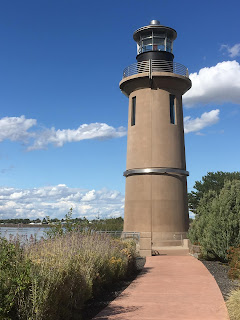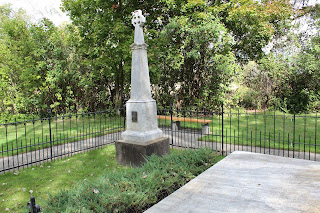Amber and I are officially moved into Pasco, WA, and I have started my new job at Bergstrom Aircraft. My sister Emily came up to help us unpack and get things organized, so when we were all done we had a couple free days to explore some of the local sites.
We started off our adventures by going to check out the lighthouse on Clover Island. It's a functioning lighthouse that was built in 2010, and placed on Clove Island, in the Columbia River. I believe it's technically in Kennewick. We were also pretty excited to see that the lighthouse has a stamp we were able to add into our United States Lighthouse Society Passport book.
The following morning we packed a lunch and set out for the short drive over to Walla Walla, WA, and the nearby Whitman Mission National Historic Site.
It was a very interesting and tragic part of history to learn about. The Whitman Mission was founded in 1836 by Marcus Whitman, and his wife, Narcissa. This was before the mass emigration on the Oregon Trail began so aside from French/Canadian trappers, the Whitmans were some of the first white settlers in the area.
Marcus and Narcissa were both products of the Second Great Awakening that occurred in America. They both believed they were called to be missionaries for the rest of their lives, and had the conviction to spread their beliefs and way of life. So they came to what is present day Washington and received permission from the Cayuse Indian tribe to build a mission. Marcus was a preacher on Sunday and practiced medicine as a doctor during the week.
Life was hard, but the Whitmans persevered in their quest. They hired what laborers they could to assist with growing crops and constructing buildings. The Cayuse Indians became receptive to the message that Marcus brought and he regularly preached to them. Very quickly, however, problems arose due to language barriers, Marcus's way of presenting & preaching, and perhaps most significant- his belief that the Indians and their culture were inferior to all whites.
In today's world it is hard to understand how missionaries could preach the Word of God, but also preach the superiority of their own culture. Today's Christian missionaries are taught how to assimilate into the people's culture whom they are attempting to reach. And Scripture is very clear that "God has made of one blood all peoples of the Earth", so there is no room for this intolerance of another culture.
As the Oregon Trail began to receive heavy use and settlers flooded West in ever increasing numbers, the Whitman's Mission began to be a short detour stop for those sick, or desiring some rest before continuing on to Oregon. The settlers brought epidemics of diseases like smallpox that they had developed resistance to, or the methods used by Marcus to treat patients usually worked on the whites. But when Marcus attempted to administer aide to the Indians who had contracted diseases, they usually died. This fueled a mistrust of the Whitmans among a lot of the Indians.
All of these misfortunes of science & medicine, language barriers, and misinterpreting Scripture eventually resulted in the unfortunate massacre that played on on November 29, 1847. A group of the Cayuse Indians attacked the mission and brutally killed Marcus & Narcissa and nine others. There were some people who escaped, but the Cayuse ended up taking fifty individuals captive. It wasn't until a month later that their return was ransomed by the Hudson Bay Company.
This event ignited the Indian Wars in the Oregon/Washington region and was a major driving force behind forcing tribes such as the Cayuse, Umatilla, and others onto reservations.
Today you can tour the land that the Whitman Mission once stood on. Markers are laid out denoting the main buildings and their dimensions and showing where each of the Whitmans died on that fateful day.
In addition to this, there is a loop trail that takes you to a memorial erected on a hill on the 50th anniversary of the attack, and a location of a mass grave as well.
Overall it was a very interesting visit to another location in our country that preserves tragedy so that we can learn from our ancestors mistakes, and hopefully not repeat them...










No comments:
Post a Comment